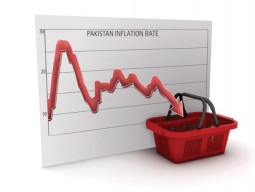
Pakistan’s current account deficit in the first two months of 2014-15 has more than doubled to $1.37 billion on a year-on-year basis, according to data released by the State Bank of Pakistan (SBP) on Friday.
The current account deficit widened by $792 million in July-August over the same two-month period of the preceding fiscal year when it stood at $580 million.
With the difference of exports and imports being the biggest determinant of the current account balance, a deficit/surplus reflects whether a country is a net borrower/lender with respect to the rest of the world.
Speaking to The Express Tribune, BMA Capital Management Research Analyst Iqbal Dinani said the sharp increase in the current account deficit can be attributed ‘to some extent’ to the month-long political unrest in the country.

As a percentage of the gross domestic product (GDP), the current account deficit widened to -2.8% in July-August as opposed to -1.4% in the same period of the last fiscal year.
Increasing imports and decreasing exports put the country’s current account balance under pressure during the last two months, Dinani noted.
Pakistan exported goods worth $3.74 billion in July-August as opposed to exports totalling $4.21 billion in the comparable months of 2013-14, reflecting a year-on-year decrease of almost 11%. The value of goods exported in August decreased by $51 million on a month-on-month basis, which is 2.68% less than the exports of $1.9 billion recorded in July.
Pakistan’s total imports of goods in July-August were $7.9 billion as opposed to $6.88 billion in the comparable period of 2013-14, which means an annual increase of 14.85%. On a month-on-month basis, however, the value of goods imported decreased 2.4%, as Pakistan imported goods valuing $3.9 billion in August.
Dinani said the rise in imports can be termed cyclical because the import bill typically goes up during Ramazan. He pointed out that the current account deficit would have been greater had Pakistan not received $371 million as part of the Coalition Support Fund (CSF) at the end of August.
Inflows under the head of the CSF are treated as exports of services, which increased 61.4% in July-August on a year-on-year basis.
Balance of trade in both goods and services at the end of the first two months of 2014-15 clocked up at -$4.56 billion as opposed to the deficit of $3.27 billion recorded in the same period of the preceding fiscal year.

Workers’ remittances remained $2.97 billion in July-August, up 12.63% from the same months of the last fiscal year when they totalled $2.64 billion. However, workers’ remittances in August decreased $320 million from the preceding month, registering a drop of 19.4% on a month-on-month basis.
The country’s balance of payment (BoP) position weakened in 20134-14, as foreign exchange reserves held by the central bank decreased to only $2.8 billion in February.
With an import cover for less than a month, a low level of foreign exchange reserves prompted federal authorities to force exporters to bring their dollar-denominated revenues into the rupees before the stipulated limit of 120 days.
SBP-held reserves improved following alleged intervention from policymakers into the foreign exchange market, resulting in a year-on-year increase of more than 50% by the end of the fiscal year in June. SBP-held reserves currently stand at $8.7 billion.
Published in The Express Tribune, September 20th, 2014.
Like Business on Facebook, follow @TribuneBiz on Twitter to stay informed and join in the conversation.
COMMENTS (6)
Comments are moderated and generally will be posted if they are on-topic and not abusive.
For more information, please see our Comments FAQ

















@Humza: What does dharna has to do with import and export? Islamabad, being center of dharna has no export base or may be you are trying to blame shortage of those 10, 000 containers detained by the government to block every road on the exports?
The problem is that a government of tax evaders, by tax evaders and for tax evaders will not take decisions that would hurt the economic interests of the ruling elite.
Pakistan need of the day is a Public Policy oriented toward value growth of general public. We need dynamic public policy to create value of individuals and Pakistani companies. We have accepted massive corruption in politics, businesses, taxation, living, and acquiring assets as part of greater corruption. Look at export, majority of our revenues comes from exporting cheap manpower, cheaper exports, exporting lesser value products, and assets going out in form of foreign currencies. It is not in bureaucratic interest to eliminate duty draw back system and high penal penalties. We really need to eliminate export duty draw back and lower penal penalties. The reason perhaps major foreign companies avoid Pakistan is probably due to lower educated workers, simple matters ending up in courts, high banking interest rate, and law order situation prevailing. CSF funds for the military do not create values for common citizen or War on Terror. No doubt the citizen of Pakistan are victim of war but look at those benefiting do not contribute to Pakistan economy. Seriously the economist and financial advisers have Failed and continue to fail in bringing about value change to the Pakistan Citizens. Look at it, what return you get reaching retirement age of Sixty. NIL, the Citizen of Pakistan are ultimate looser in paying Taxes. Therefore Investments Fly away into Foreign Banks. Think About It.
In Govt who gives a
This is the real goal of Imran Khan and Tahirul Qadri - to destabilize Pakistan and to weaken the economy. All indices were pointing upward including an improving ranking of the economy by international analysts. This was too much to bear for anti state forces who are conspiring to bring down the economy. Now they want people to use Hundi, burn energy bills, not pay tolls as part of the great anti state conspiracy of the sore losers movement of "Naya Pakistan" which sounds more like " No Pakistan".
Time to wake up................